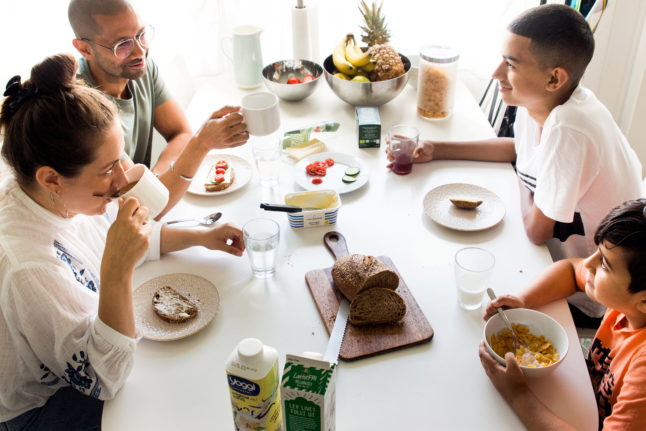People often say that the moment you know you speak a language fluently is when you begin dreaming in it.
What they don’t tell you is that the next marker of your fluency comes when you start substituting words in your native language with words from the foreign language. Here are a few Swedish words I’ve started using more and more when I speak English.
Mys
Equivalent to the English word “cosy” or the Danish “hygge”, I find myself using the Swedish word mys (noun) or mysigt (adjective) often in English, even making up my own compound Swedish-English words using mys.
One example is mysväder, literally “cosy weather”, which can roughly translate as the kind of weather where it’s socially acceptable to lie on your sofa with a hot chocolate under a blanket and watch TV (so perfect autumn weather, essentially). The perfect clothing for mys-weather is mys-clothes, like tracksuit bottoms or pyjamas, a soft wooly jumper and a pair of warm socks.
I’ve found myself on more than one occasion saying “oh the weather today is really mys-weather, isn’t it?”, indicating to whoever I’m talking to that I plan on going into hibernation as soon as I get home. If a friend asked me to join them for a day trip somewhere or a fika at a nice cafe, I might say “oh, that sounds mysigt!”, roughly in the same way an English speaker could say “yes, that sounds nice!”. Mys just feels less generic than “nice”, when used in this way.
Swish
Maybe a bit of a cheat in this list of supposedly Swedish words, I regularly use the verb swisha in English if I pick up the bill in a restaurant for a friend. “Oh, it’s okay, you can just swish me,” I say, telling the friend to use payment service Swish to pay me back.
In the same vein, I might tell my husband “I’ve sent you a swishförfrågan (Swish request) for the dagisavgift (preschool fee) this month”, as a not-so-subtle hint for him to log in to the app and send over his half of the payment.
Typ
Typ is a bit of a filler word in Swedish, used in the same way as “like” in English. Not in the sense of liking something, but in the sense of filling a gap in speech or indicating you’re not sure of something. So instead of saying “it costs, like, 30 kronor,” you might say “det kostar typ 30 kronor”.
I use typ so unconsciously in Swedish that it’s started creeping into my English when I fill a gap in speech while I think, in sentences like “I think that was… typ… four days ago?”, or if I’m not sure of the exact amount of something, like if someone asks me how I baked a cake, I might say “and then I added 200g of flour… typ.”
Macka
This maybe says more about my lifestyle than anything else, but I use the Swedish word macka (bread with topping) every single day, usually when I ask my daughter what she wants for breakfast.
Swedes love to eat bread with toppings for breakfast, referred to as a macka, occasionally a rostmacka if toasted. Unlike toast, which is usually only eaten with butter, a macka can be hot or cold, and topped with anything from ham to salami, hummus or cheese. The words “do you want macka or porridge?” and “what do you want on your macka?” are uttered every morning, without fail, in our household.
Snippa
Another Swedish word linked to child-rearing, the word snippa is an informal, not-rude Swedish word for female genitalia. The male variant would be snopp, similar to the English word “willy”.
I haven’t been able to find an informal English version of snippa which is child-friendly and easy for my daughter to pronounce, so I usually use the Swedish word if I’m telling my toddler daughter to wait after a visit to the toilet and wipe her snippa.
Sugen
Sugen is a great Swedish word similar to “hungry”, but more in the sense of “snacky” – you’re not really hungry, but you fancy eating something small and most likely unhealthy, like a biscuit or some crisps.
It’s the kind of word you would say if your partner caught you gazing into the kitchen cupboards a few hours after lunch looking despondent. “Are you hungry?”, they might ask, only for you to respond “nah, not really, I’m just a bit sugen.”
Mellis
It’s similar to the word mellis, another Swedish word which has crept into my English. Mellis is short for mellanmål, literally “between-meal”, but more often used as a small snack to tide you over to the next meal, like an apple or a macka.
VAB
Finally, an essential word for all parents in Sweden, VAB. VAB stands for vård av barn, and is the term for taking time off work to look after a sick child. Usually used in talking to your boss, you might say “my child has a fever so I’m going to have to vab today”, or negotiate with your partner “if I vab this time, can you vab next time?”
It’s just so much easier than saying “I’m going to have to take paid time off work to look after my sick child”.
What Swedish words have made their way into your English? Let us know in the comments!




 Please whitelist us to continue reading.
Please whitelist us to continue reading.
English for snippa: Chooch, or choocha
I have a Fika or two every dag